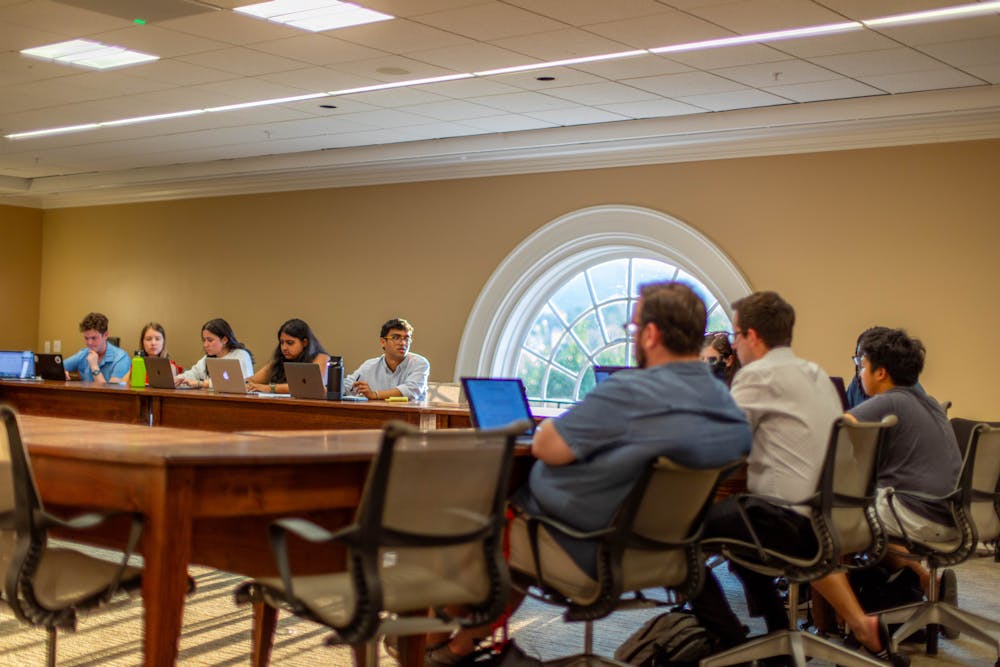The Honor Committee held a training for due process guidelines and continued their consideration of a community service sanction at their meeting Sunday. With 20 out of 27 members present, the Committee met quorum and was able to vote on matters concerning the constitution and bylaws.
Third-year Law Rep. Daniel Elliott and Second-year Law Rep. MK O’Boyle administered the training to the Committee. The training happens on a yearly basis and is designed to help Committee members understand the guidelines of due process — constitutional rights citizens are afforded during legal cases — for Honor proceedings.
Elliott and O’Boyle said these trainings are essential both to help the Honor Committee’s function and to protect the constitutional rights of students at the University.
“As a public university who has several constitutional obligations that private universities don't have, and which come up a lot in our work, we find it important to talk about [due process] every year,” Elliott said.
The University is a public institution, meaning its internal policies and practices are subject to all state and federal laws, whereas a private institution is allowed to develop its own internal systems and regulations.
The due process training was particularly important for this Committee due to the recent passage of the multi-sanction system. The multi-sanction system expands upon the previous single sanction system to include expulsion, suspension, education and amends.
Under the new system, students are allowed trials, which include a Panel for Sanction made of five Committee members that will consider the Honor offense and propose a sanction. The panel acts as one step in a student’s due process.
Graduate Architecture Rep. Tim Dodson said Committee members should be especially committed to protecting due process given the changes to the sanctioning process.
“This semester we're starting to implement a system that's new to us,” Dodson said. “Just in the back of our minds, we should always be thinking about if we are upholding our due process obligations, to make sure that students’ cases are heard in a fair and impartial manner.”
Following training on due process, the Committee moved into a discussion on the community engagement sanction. The community engagement sanction — if passed — will allow students to make amends through community engagement like environmental programs, youth programs and more.
Dodson, who also serves as the Policy and Procedures Sub-Committee co-chair, presented on P&P’s recent work developing the community engagement sanction and discussed possible partnership requirements that would regulate how the new sanction would function.
“Any sort of partnership that would be part of a community engagement sanction would have to be mutually beneficial to both the harmed parties and the student offender, and performed with the consent of the harmed group or organization,” Dodson said.
The Committee discussed this topic in a previous meeting, where members outlined possibilities for the sanction that included the Panel for Sanction deciding the specific community engagement program or guilty students selecting a program to be approved by panelists. The Committee hasn’t voted yet on the matter.
Second-year Engineering Rep. Alexander Church expressed concern that the community engagement sanction would overlap with the amends sanction, and would not provide as much direct involvement with the harmed parties. The amends sanction entails that the guilty student take a form of action to repair their relationship with the Community of Trust.
“The ways in which community engagements are proposed here and specifically looking at some of the examples that were given, I think a lot of them do fall more under amends,” Church said. “I'm sort of unsure on the merit of community engagement.”
Dodson gave the example of a student who unfairly used SDAC accommodations to commit an Honor offense, and therefore that student’s sanction could be to be an SDAC note taker. The Committee did not take an official vote on the matter.
Next, the Committee continued their planning for their Popular Assembly event — the Committee changed the date from November to early February because they were they concerned that the November date would clash with preparation for final projects and exams.
Prior to the passage of the multi-sanction system, the Popular Assembly was held on a bi-annual basis, with the last Popular Assembly being held in spring of 2021. The event will now be held on an annual basis, as detailed in the new constitution.
The Committee also heard executive and representative reports. There are currently six active investigations and two hearings scheduled for Oct. 15 and Oct. 21, respectively.
The Committee adjourned the meeting at their scheduled end time of 8 p.m. The next Honor Committee meeting will be held Oct. 8 at 7 p.m. in the Trial Room of Newcomb Hall.







